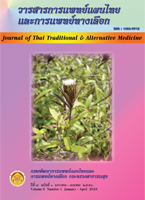Sodium-free Salt
Main Article Content
Abstract
Saltiness refers to the taste of salt. Salt has an appetizing taste; almost every one likes the taste of it, but most of us are consuming too much salt (sodium chloride, or table salt) which can raise one’s blood pressure. Reducing salt intake to less than 6 g a day could prevent hypertension, stroke, and heart disease.
Unprocessed fresh foods, such as fresh fruits, vegetables, lean meats, poultry, fish and unprocessed grains, are low in sodium, and are suitable for preparing low-salt menus. Because most hypertensive persons need to restrict their consumption of table salt, salt substitutes are becoming very popular. Potassium chloride is a salt substitute that has the familiar flavour of table salt but promotes good health. For example, some products contain 66 percent sodium chloride; the rest is potassium chloride. Some products contain zero sodium, but are mixtures of potassium chloride, amino acids and other minerals. However, many persons with kidney problems are unable to rid their bodies of excessive potassium, which could result in a harmful effect. For persons with kidney problems, or who are taking medication for their heart, kidneys, or liver, it is best to check with their physician before using salt substitutes in place of sodium.
Article Details
References
2. Way CV. Hypertension. In: Way CV, editor. Nutrition secrets. Philadelphia: Hanley & Belfus, Inc., 1999. p. 105-8.
3. Williams SR. Nutrition and diet therapy. 8th Ed. St.Louis : Mosby, 1997.
4. http://www.Losalt.com. Accessed on April 2010.


